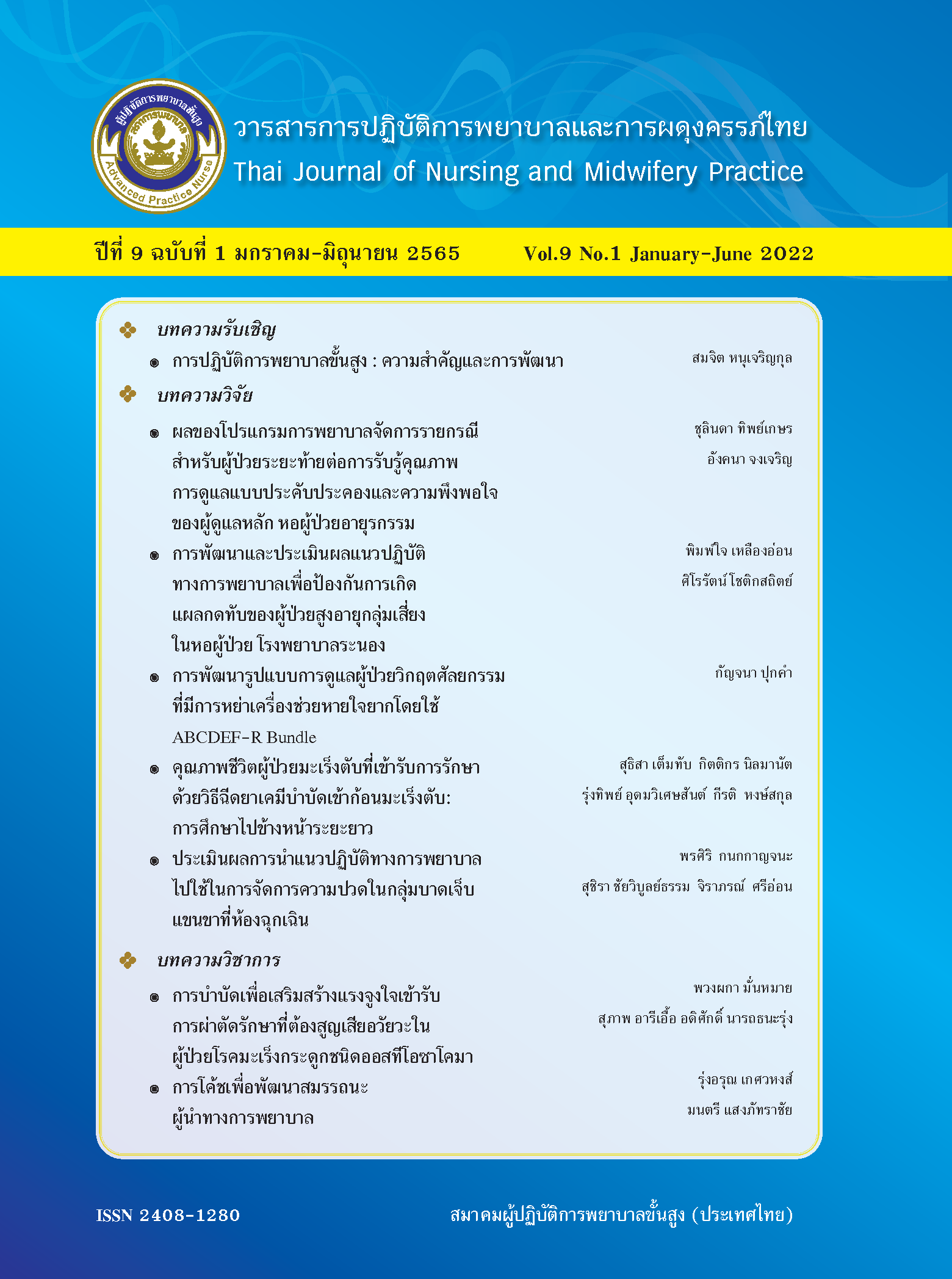Development of practice guideline for pressure injury prevention in high risk patients Ranong Hospital, Ranong Province
Main Article Content
Abstract
The aim of this research was to study the effect of the development of nursing practice guideline for the prevention of pressure injury of the high-risk patients at Ranong Hospital, Ranong province. The subjects, who were 112 professional nurses and high-risk patients of pressure injury group aged more than 60 years old who have not had no pressure injury, were recruited. The criteria of assessment were the patients who have Barden Scale £18 points. Based on the Barden Scale criteria, 697 patients were admitted in 10 wards during September 2021-February 2022. Data were analyzed by using descriptive and comparative statistics. After applied the developed practice guideline in professional nurses, the results showed that they have significantly higher knowledge (p=0.001) for the preventing pressure injury of high- risk patients. When compared with the target average score of the preventing pressure injury of high-risk patients that was fixed at 75%, the results showed that the average of their attitude was significantly higher than the target average score (p=0.001). The rate of pressure injury in high-risk patients was decreased from 5.22 to 2.80 per 1000 days (length of stay in high-risk patients) when compared to that of before the development of nursing practice guideline. The results indicated that the success of the development of nursing practice guideline for the prevention of pressure injury of high-risk patients of pressure injury at Ranong Hospital, Ranong province
Downloads
Article Details

This work is licensed under a Creative Commons Attribution-NonCommercial-NoDerivatives 4.0 International License.
References
Shahin ES, Dassen T, Halfens RJ. Pressure ulcer prevention in intensive care patients:
guidelines and practice. J Eval Clin Pract. 2009 ;15(2):370-74.
Coleman S, Nixon J, Wilson L, McGinnis E, Dealey C, et al. .A new pressure ulcer conceptual framework. JAN. 2014;70(10):2222-34.
Nursing Organization, Ranong Hospital. Nursing supervision report of Ranong Hospital for year 2021. Ranong Hospital, 2021.
National Health and Medical Research Council. [NMRC]. (1999). A guide to the developmental, implementation and evaluation of clinical practice guidelines. Retreived April 10, 2022, from http://www.nhmrc.gov.au/_file/_nhmrc/file/publications/synopses/cp30.pdf
Suttipong C. & Sinduh S. Factors predicting development of pressure ulcer in non-diabetic elderly stroke patients. Journal of Nursing Science 2011;29(2): 113-123. [In Thai]
Saimek R. Development and evaluation of clinical nursing practice guidelines for pressure ulcers prevention among elderly patients in intensive care unit [Dissertation].Songkla: Prince of Songkla University; 2016.(In Thai)
Makaraphirom A. Development of practice guideline for pressure sore prevention in Trat Hospital. Journal of Nursing Division 2020; 47(1): 139-52(In Thai)
Dongpho P. Effectiveness of clinical practice guidelines implementation for pressure sore prevention. Thammasat Medical Journal 2019;19(2):80-89. (In Thai)
Chai-aree C. Effectiveness of implementing clinical nursing practice guidelines for preventing pressure Iinjury at Nakhonpathom Hospital. Region 4-5 Medical Journal 2020; 39(4):684-96. (In Thai)
Thepchai P. Evidence-based practice for pressure ulcer prevention among perioperative nurses. Songklanagarind Journal of Nursing 2018; 38(3):38-51. (In Thai)


